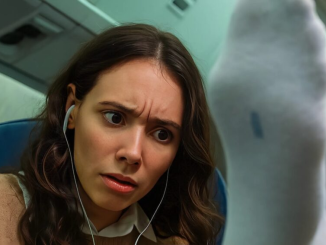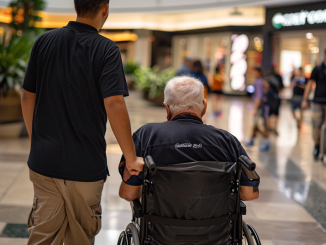
We’d been in that hospital room for three days. It was starting to feel like time had just… stopped.
Owen was doing okay, considering everything. He was still hooked up to IVs and refusing to eat anything but those sad little ice pops. But he was alert, and asking questions—mainly about when we could go home and whether the dog missed him.
That afternoon, an officer showed up. Said he was doing a “wellness visit” because someone had called in a request for a little morale boost. I figured it was one of the nurses—probably Trish, the one who always sneaks Owen extra Jell-O.
He knelt down right by Owen’s bed and offered him his radio. Like, the police radio. Owen’s whole face lit up. You could tell he felt powerful holding it. He kept turning it over in his hands like it was made of gold or something.
The officer leaned in and showed him how to press the button. “Say hi,” he said. “The dispatchers love when our littlest heroes check in.”
Owen pressed the button, grinning. “Hi, this is Officer Owen.”
There was a moment of static, then a soft voice came through. “Officer Owen, we copy. We’ve been waiting for you.”
I smiled. Owen giggled.
But then the voice kept talking.
“We’ve got a report coming in… suspect matching description of female, mid-thirties, dark-framed glasses, seen exiting pediatric oncology wing three nights in a row… returning alone.”
My smile froze.
I glanced at the officer. His expression changed. Just slightly. Like he suddenly remembered something. He stared at me.
He reached slowly for the radio.
And that’s when Owen said—“That sounds like Mommy!”
My heart dropped.
The officer’s hand paused in mid-air. For a second, there was a heavy silence in the room. Then the radio crackled again.
“Possible trespass. Investigation pending. Approach with caution.”
I shot up from the chair. “Wait, what is this? Is this some kind of joke?”
The officer’s eyes flicked toward me, and something about his gaze made me feel suddenly exposed. Not threatened, exactly. Just… seen.
“Ma’am, have you been staying overnight here?” he asked, voice calm but measured.
I nodded, confused. “Of course I have. My son’s sick.”
He looked at the clipboard at the end of Owen’s bed. “It says visitors are cleared until 8 p.m., except parents with overnight badges.” He glanced at my chest. “You’re not wearing one.”
“I lost it,” I said quickly. “The strap broke. But I’m his mom. They know me here.”
He didn’t say anything. Just looked at me in that way officers do, like they’re mentally cross-referencing your words with something they already know.
I sat back down, my hands shaking. “I haven’t done anything wrong.”
Owen looked between us. “Is Mommy in trouble?”
The officer shook his head and smiled gently. “No, buddy. We’re just talking.”
But his eyes told a different story.
And that’s when I knew: someone had reported me. Not just seen me—but actually taken the time to report me.
It didn’t make sense. I’d done nothing except sit by my son’s side. So why did it suddenly feel like I was being watched?
Later that night, after Owen fell asleep, I stepped into the hallway. Trish was working the night shift, refilling IVs and fluffing pillows like she always did.
“Hey,” I whispered, pulling her aside. “Did you… call in that officer today?”
She shook her head, looking surprised. “No. But wasn’t it sweet? He brought his own nephew in once. Real nice guy.”
I swallowed hard. “Somebody reported me. Said I’ve been sneaking out of this wing at night.”
She frowned. “That’s ridiculous. You haven’t left Owen’s side since he was admitted.”
I hesitated. “Well… except for those few nights.”
She tilted her head. “What nights?”
I looked down at the floor. “There were a couple times… I went down to the garage. Just for air. Maybe twenty minutes, tops. It’s stupid, I know, but I felt like I was losing it. I needed to breathe.”
Trish’s face softened. “That’s not a crime, hon. But if someone reported it, maybe there’s more going on.”
And there was.
The next morning, a social worker showed up. She introduced herself gently, asked if we could speak privately. Owen was asleep again, worn out from his morning treatment.
We stepped out into the hallway, and she held a file in her hands.
“I want to start by saying no one is accusing you of anything,” she said, in that overly careful tone that always means the opposite. “But someone has raised concerns about your mental health and your son’s care.”
My stomach clenched.
“What?” I said. “I’ve been here every single day. I haven’t missed a thing. I’ve been taking care of him—better than anyone.”
“I believe you,” she said, nodding. “But this report says you’ve been acting erratically. Leaving at odd hours. And… possibly taking supplies from the hospital.”
I froze.
“That’s not true,” I whispered.
She looked at me kindly, but with a hint of doubt. “No one’s saying it is. But can you tell me where you’ve been going at night?”
I wanted to scream. I wanted to cry. But I knew that wouldn’t help.
So I told her the truth.
Three nights ago, I’d gone down to the hospital garage around midnight. I’d walked a few blocks to the all-night diner near the corner. I wasn’t hungry. I just needed noise, something normal.
But I didn’t go alone.
That’s the part no one knew.
There was another kid in the ward—Ava. She was seven, bald from chemo, quiet as a mouse. Her mom, Teresa, had passed out from exhaustion that night in the recliner by her bed. And Ava had gotten scared. I found her crying in the hallway.
She didn’t want to wake anyone. She just wanted a milkshake.
So I took her with me. We walked, hand in hand, to the diner.
I bought her a strawberry shake and we sat at the counter while the night cook hummed along to old jazz.
I didn’t think it was wrong. I still don’t.
But when I said it out loud to the social worker, I could see the calculation forming in her mind.
“You left the hospital premises,” she said slowly, “with someone else’s child. Without permission.”
“She was crying,” I said. “She was scared. Her mom was asleep. I just—”
“You understand how that might be viewed, right?”
I did.
I also knew I’d never meant any harm. But harm wasn’t the only thing people cared about. Perception mattered. Liability mattered. And now I was being scrutinized like I was a risk.
They didn’t remove Owen from me. But they did restrict my movements. No more late-night walks. No more helping other parents. No more “hero moments.”
That should’ve been the end of it.
But then, three days later, something happened that changed everything.
Owen took a sudden turn for the worse. High fever, erratic heart rate. Doctors rushed in with crash carts. I stood frozen in the corner, heart thudding so loud I could barely breathe.
Then I saw her—Ava’s mom, Teresa. She’d just returned from picking up her other child from school. She saw me standing there and came running.
When she learned what had happened, she did something I’ll never forget.
She told the doctors and nurses exactly what I’d done for her daughter.
How I’d taken her to get a milkshake when she was too exhausted to keep her eyes open. How I’d held Ava’s hand and talked to her about clouds and cartoons and made her laugh in the middle of hell.
She looked right at the social worker who’d been monitoring me and said, “If this woman hadn’t been here, I don’t know what state I’d be in right now. She’s not a danger. She’s a blessing.”
The room was quiet.
The social worker didn’t say anything, but I saw the way her expression softened. Like maybe—for the first time—she believed me.
A few days later, Owen began to recover. Slowly, but surely.
We stayed another week, and something shifted in that time. Nurses started smiling at me again. Trish brought me coffee without asking. Even the officer from before came back—this time to give Owen a plastic badge and let him “swear in” as an honorary junior cop.
But more than that, the hospital started a new rule: a buddy system for parents on the ward.
Late-night walks were now allowed—but only in pairs, and with security notified. It was their way of saying, we trust you, but let’s keep it safe.
It wasn’t a punishment. It was a compromise. A quiet nod that maybe they’d judged too quickly.
On the day we left, Teresa hugged me tight. Ava gave me a drawing—me, her, and Owen sitting in the diner with milkshakes and giant cartoon eyes.
“You reminded me what kindness looks like when I forgot,” Teresa whispered.
I smiled. “We were just helping each other.”
And that’s the truth.
Because sometimes, being a good person doesn’t look perfect. It looks like showing up in the small moments. Like letting a kid feel brave by holding a radio. Like listening when no one else will.
If I’d let fear or rules keep me silent, none of that would’ve happened.
In the end, it wasn’t about who followed the rules—it was about who cared enough to do what was right, even when it didn’t make sense to anyone else.
So yeah, the police officer let my son hold his radio.
But what came through it? That wasn’t a warning. It was a wake-up call.
Because being seen might be scary—but it also might be exactly what saves you.






Leave a Reply